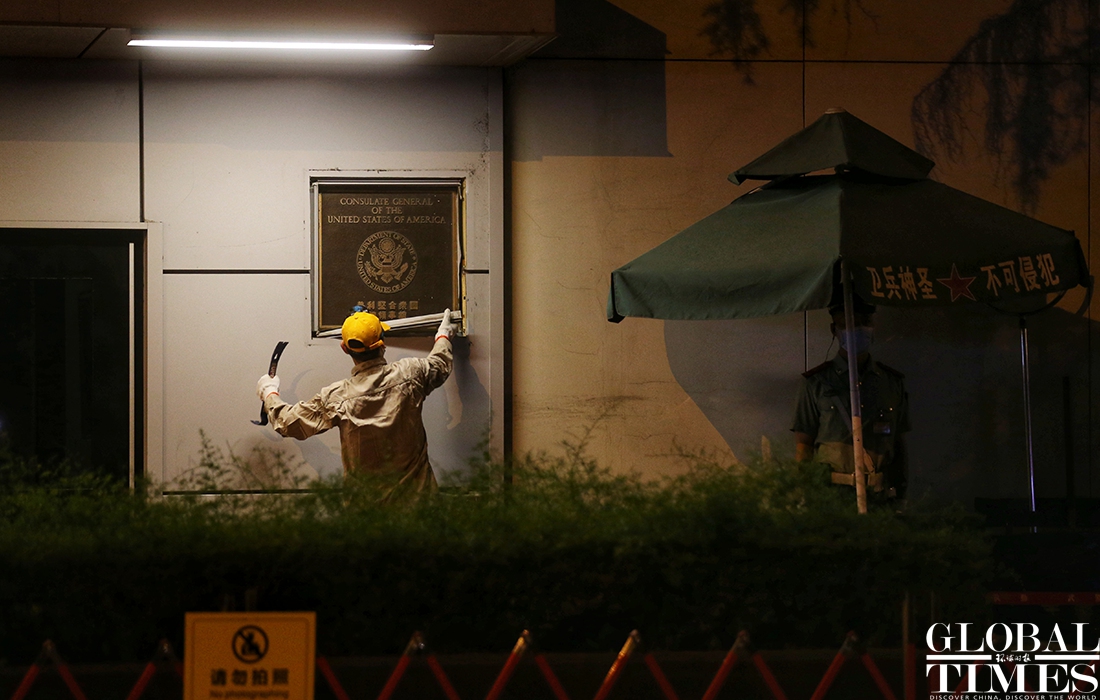US suppression of China is not just about ideological differences
By Ling Shengli Source: Global Times Published: 2020/7/28 15:30:30

A worker removes the US emblem for a diplomatic mission at the entrance of US consulate in Chengdu on Sunday evening. Photo: Cui Meng/GT
In recent days, diplomatic clashes have erupted between China and the US. The US took the unprecedented step of closing Chinese consulate in Houston. In the face of US' unwillingness to correct its erroneous decision, China announced the closure of the US consulate in Chengdu. The clashes are likely to get worse as the US has threatened to close even more Chinese consulates.
The relationship between China and the US faces great challenges, with growing concerns about whether the two sides could slip into a new cold war. But the big question is why the US strategy towards China has become so tough.
There is even a view that if China is a Western-style democracy, the US strategy toward China may not be so caustic, as Washington's pressure on Beijing is related to the failure of US engagement strategy with China. However, this is obviously misperception. The US pressure on China is not only related to ideological differences between the two sides, it boils down to the US wanting to maintain a hegemonic position of global power.
Ideological differences between China and the US have existed since the founding of the People's Republic of China in 1949, prolonging until former US president Richard Nixon's visit to China in 1972. After the end of the Cold War, the US implemented a strategy of engagement and containment toward China.
The main factors that determine the degree of engagement and containment have been the power gap and ideology between the two countries - the power gap plays a more dominant role. As a hegemonic country, the US maintains its power by ensuring that other countries do not pose a threat to its leading status. A US definition of a "threat" relates to the two above mentioned factors. Therefore, the recently intensified US' campaign against China is linked with the narrowed gap between the two countries.
Given that the US had put pressure on its allies, such as Japan and Europe, mainly out of fear of losing its hegemony due to allies' increased power, the US will not give up its suppression of rising states despite they share the same political ideology.
This is especially evident in the US' suppression on Japan. In the 1980s and 1990s, economic and trade friction between Washington and Tokyo never stopped. This had little to do with ideology.
In the maintenance of US hegemony, the strength is more important than values. This is also the main principle of how hegemonic countries behave toward others. Since the Trump administration took office, it has paid more attention to US advantages in strength based on the "America First" doctrine.
Ideological differences have to some extent resulted in changes in China-US relations. But the more profound reason is many US politicians are concerned about China's rising strength.
Unlike his predecessors, President Trump has attached less importance to ideology. His strategic adjustment over China is mainly due to concerns that the narrowing of the China-US power gap will endanger American hegemony.
China adheres to the leadership of the Communist Party of China (CPC) and follows the socialist path. This lies with China's core interests and determines that China will not subscribe to US political forms. Ideological differences are not the essence of the US' escalating campaign against China. They are a disguise made by US politicians who are trying to sow discords between the CPC and Chinese people.
The path of democracy is diverse, and Western-styled democracy is not the only option. China's choice suits its own national conditions and has contributed to the country's rapid development. In fact, Western-styled democracy has long lost its luster. US elites should themselves reflect deeply on the terms of their democratic superiority.
Today's US democracy has done nothing to combat the rampant pandemic. The political polarization in the US has led to social divisions and hindered the country's development.
The narrowing of the China-US power gap is the main reason why Washington is trying to suppress Beijing so vehemently. In order to legitimate their vicious campaign, certain US politicians have stigmatized the China-proposed Belt and Road Initiative, the Asian Infrastructure Investment Bank, and so on. Now they are slandering China ideologically. This actually shows that the US is outwardly strong, but inwardly weak.
The author is secretary-general of the International Security Study Center at China Foreign Affairs University. opinion@globaltimes.com.cn
Posted in: VIEWPOINT